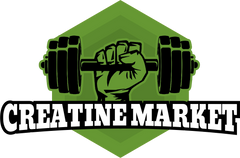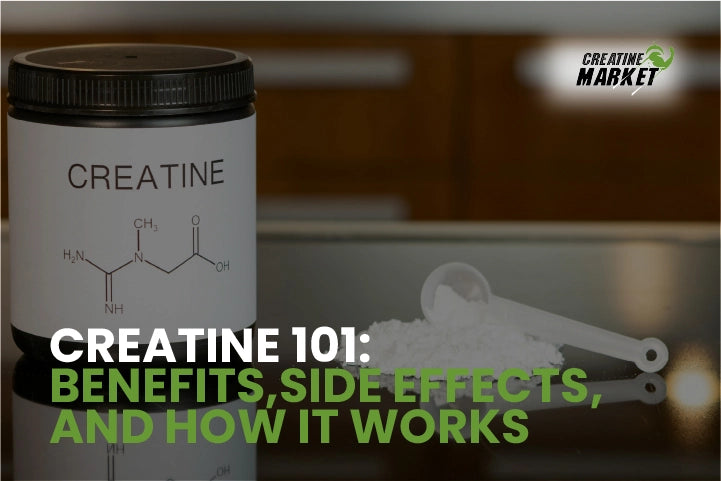Despite being one of the most studied supplements in sports nutrition, creatine continues to be surrounded by misconceptions and myths. Let's examine the science behind these common beliefs and separate fact from fiction.
Understanding Creatine's Basics
Before diving into specific myths, if you're new to creatine and wondering if it's right for you, our detailed Beginner's Guide on Creatine Use can help you make an informed decision.
Myth #1: "Creatine Is a Steroid"
The Fiction: Many people mistakenly believe creatine is a type of anabolic steroid or that it works similarly to steroids.
The Facts:
- Creatine is a naturally occurring compound found in muscle cells
- It's produced by your body and found in foods like meat and fish
- It has no hormonal properties or effects
- The mechanism of action is completely different from steroids
- It's legal and approved for use in sports
Myth #2: "Creatine Damages Your Kidneys"
The Fiction: A persistent myth suggests that creatine supplementation leads to kidney damage or dysfunction.
The Facts:
- Multiple long-term studies have shown creatine is safe for healthy individuals
- No evidence of kidney damage in people with normal kidney function
- Regular blood work of long-term users shows normal kidney markers
- Athletes have safely used creatine for decades
- Increased creatinine levels during supplementation are normal and not harmful
Myth #3: "You Must Load Creatine"
The Fiction: You need to take large doses (20g daily) for the first week to see results.
The Facts:
- Loading is optional, not mandatory
- Regular dosing (3-5g daily) achieves the same results
- Loading simply saturates muscles faster
- Many people experience fewer side effects with regular dosing
- Consistent daily use is more important than loading
Myth #4: "Creatine Is Only for Bodybuilders"
The Fiction: Only strength athletes and bodybuilders can benefit from creatine supplementation.
The Facts:
Research shows benefits for:
- Team sport athletes
- Endurance athletes
- Older adults maintaining muscle mass
- Vegetarians and vegans
- People with neurological conditions
- Individuals seeking cognitive benefits
Myth #5: "Women Shouldn't Take Creatine"
The Fiction: Creatine will make women bulky or is somehow inappropriate for female athletes.
The Facts:
- Benefits are similar for both men and women
- No gender-specific side effects
- Doesn't cause masculine features
- Can enhance strength and performance
- Particularly beneficial for female vegetarians
Myth #6: "Creatine Causes Water Weight That Turns to Fat"
The Fiction: Initial water weight gain from creatine eventually converts to fat tissue.
The Facts:
- Water retention occurs within muscles, not under skin
- Weight gain is from increased muscle hydration
- No mechanism for converting water to fat
- Enhanced hydration can improve performance
- Water weight normalizes with continued use
Myth #7: "You Must Cycle Creatine"
The Fiction: You need to stop taking creatine periodically to maintain its effectiveness.
The Facts:
- Long-term studies show continuous use is safe
- No evidence of decreased effectiveness over time
- Body maintains normal creatine production
- Cycling may reduce beneficial effects
- Consistency provides optimal results
Myth #8: "Some Forms of Creatine Are Superior"
The Fiction: Newer, more expensive forms of creatine offer significantly better results.
The Facts:
- Creatine monohydrate remains the most studied form
- No consistent evidence showing superior alternatives
- Most research uses creatine monohydrate
- Cost-effective and reliable
- Other forms lack substantial scientific support
Science-Based Usage Guidelines
To get the most out of creatine supplementation: 1. Choose basic creatine monohydrate 2. Take 3-5g daily 3. Stay consistent with supplementation 4. Maintain adequate hydration 5. Combine with proper training and nutrition
Common Signs of Creatine Misinformation
Be skeptical of claims that: - Promise overnight results - Suggest magical properties - Contradict established research - Come without scientific citations - Push expensive "advanced" formulas
Conclusion
Understanding the science behind creatine helps dispel these common myths. As one of the most researched supplements available, creatine has consistently proven its safety and effectiveness when used properly. Don't let misinformation prevent you from potentially benefiting from this well-studied supplement.
Remember that while these myths have been debunked by scientific research, it's always important to: - Consult with healthcare providers about specific concerns - Research using reliable, scientific sources - Make informed decisions based on personal goals - Follow proper usage guidelines - Monitor your individual response
By understanding the truth behind these myths, you can make better-informed decisions about creatine supplementation and its role in your fitness journey.




